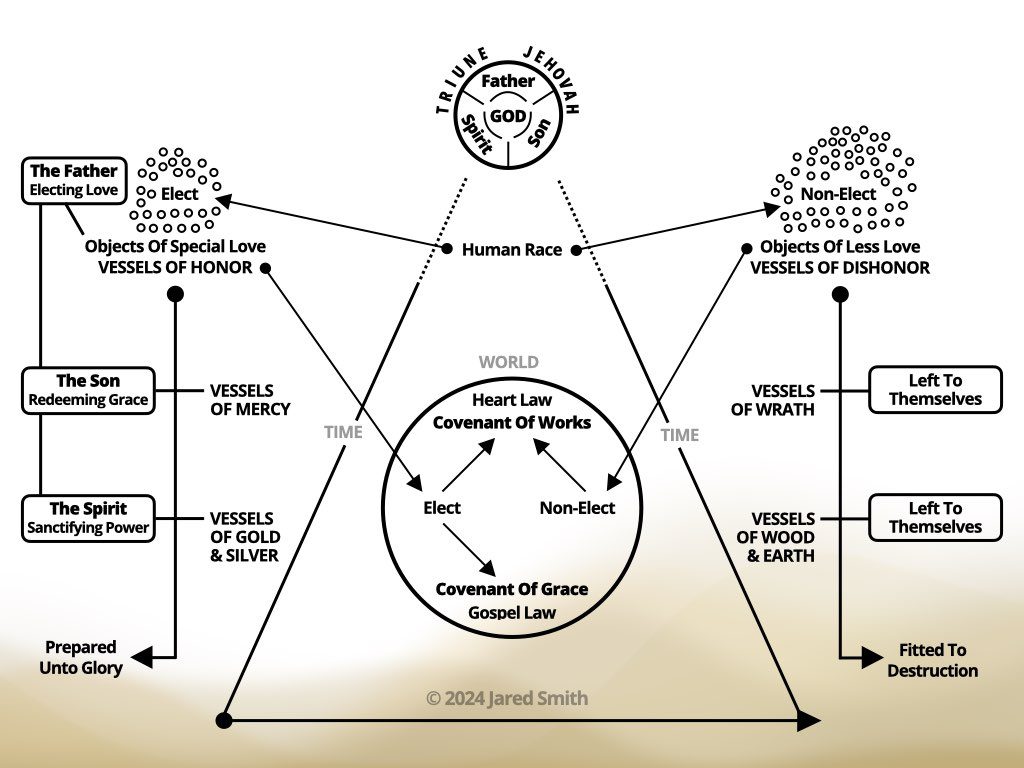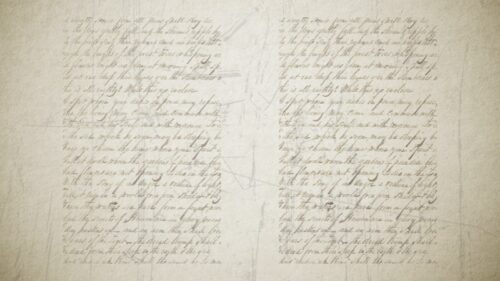O God, Our Help In Ages Past
The Apostle Paul instructed the believers at Colosse to teach and admonish one another in psalms, hymns and spiritual songs. That is what I hope to do by explaining the meaning of this hymn, against the backdrop of the Framework of Sovereign Grace.
O God, Our Help In Ages Past
[An automated transcript of the teaching video]
The Apostle Paul instructed the believers at Colosse to teach and admonish one another in psalms, hymns and spiritual songs. That’s precisely what I hope to do by explaining the meaning of this hymn—O God, Our Help In Ages Past. I’d like to explain the meaning of the hymn against the backdrop of the Framework of Sovereign Grace, which is God’s master plan for the ages.

You’ll notice the hymn was written by Isaac Watts. Isaac Watts was an 18th century Congregational preacher, a sovereign grace preacher, and he is known as the father of hymnody.
I’d like to read for you the nine stanzas of this hymn:
1 Our God, our help in ages past,
Our hope for years to come,
Our shelter from the stormy blast,
And our eternal home.
2 Under the shadow of Thy throne,
Thy saints have dwelt secure;
Sufficient is Thine arm alone,
And our defense is sure.
3 Before the hills in order stood,
Or earth received her frame,
From everlasting Thou art God,
To endless years the same.
4 Thy Word commands our flesh to dust,
“Return, ye sons of men:”
All nations rose from earth at first,
And turn to earth again.
5 A thousand ages in Thy sight,
Are like an evening gone;
Short as the watch that ends the night,
Before the rising sun.
6 The busy tribes of flesh and blood,
With all their lives and cares,
Are carried downwards by the flood,
And lost in following years.
7 Time, like an ever rolling stream,
Bears all its sons away;
They fly, forgotten, as a dream,
Dies at the opening day.
8 Like flowery fields the nations stand,
Pleased with the morning light;
The flowers beneath the mower’s hand,
Lie withering ere ‘tis night.
9 Our God, our help in ages past,
Our hope for years to come,
Be Thou our guard while troubles last,
And our eternal home.
The hymn underscores the eternal and unchanging nature of God, Who reigns supreme in heaven and on earth. Now, please listen. A distinction must be made between (the terms) eternity and everlasting. Properly speaking, God is eternal, but He is not everlasting. That is, eternity exists outside the sphere of time. Eternity is separate from the time continuum. The nature of God is eternal. There is no past, present or future. God simply is. He is eternal. He exists in Himself without beginning and without end.
Now, some people think of eternity as a place—a place where God lives. But that’s a false concept. Eternity is not a place, it’s an attribute—an attribute of the Godhead. God himself is eternal. God doesn’t dwell anywhere. You see, if God dwelt somewhere, then that somewhere would be greater than God and God therefore would not be God. God doesn’t dwell anywhere. God exists in Himself, outside of time and space.
The word everlasting, however, is applied to the time continuum. God created time on the first day of creation. It has a beginning, but it has no ending. That is what is meant by everlasting. It has a beginning, but it’s everlasting. It has no ending. God will forever perpetuate time. Angels and humans will live forever. Now you see in this sense, humans are everlasting, for their souls will continue to exist after physical death. And of course, when Christ returns, their souls will be reunited with their bodies, and their souls and bodies together will then continue to live forever, either in heaven or in hell.
So then, properly speaking, God is eternal, but not everlasting. Whereas humans are everlasting, they are not eternal. Now listen, it’s because God is eternal, that He alone is unchanging, and it is this which the Hymn underscores. You see, my dear friend, one of the most comforting and assuring truths concerning the nature of God is that He is not subject to the limitations of time or to change. Every good gift, every perfect gift, cometh from the Father of lights, with whom there is no variableness, neither shadow of turning. Henceforth,
Stanza 1
“Our God, our help in ages past,
Our hope for years to come,
Our shelter from the stormy blast,
And our eternal home.”
So, if this is you or me on earth now, then our God, He’s our help in ages past—what’s happened before in our lives. He’s been a help to us and He’s our hope for years to come. He’s our shelter from the stormy blast, and he’s our eternal home.
Stanza 2
“Under the shadow of Thy (eternal) throne,
Thy saints have dwelt secure;
Sufficient is Thine arm alone,
And our defense is sure.
Stanza 3
“Before the hills in order stood,”
That was on the first week of creation, as God was bringing all things into existence.
“Or earth received her frame,
From everlasting Thou art God,”
Meaning, from the very beginning when God called time into existence, He is God. He’s eternal.
“To endless years the same.”
He’s unchanging.
Stanza 4
“Thy Word commands our flesh to dust,”
So God, having decreed from eternity all things that will come to pass throughout the course of history—it’s His word, His decree, that commands our flesh to dust. That is, He brings us into existence. And He it is who also exits us from this world.
“Return, ye sons of men:”
All nations rose from earth at first,
And turn to earth again.”
Not just individual men and women, but all nations of the earth rose from earth at first and turn to earth again. Not only the individual men and women, but whole nations of the world have been given their increase by God and they are brought low and brought to nothing by God.
Stanza 5
“A thousand ages in Thy sight,
Are like an evening gone;”
A thousand years are as one day with the Lord.
“Short as the watch that ends the night,
Before the rising sun.”
You know, when the sun goes down and the sun comes up and there’s a watchmen keeping guard at night. It’s a very short time, and that is as it is with God.
Stanza 6
“The busy tribes of flesh and blood,
With all their lives and cares,
Are carried downwards by the flood,
And lost in following years.”
His view of the many years throughout the course of history—the busy tribes of flesh and blood with all their lives and cares. Just think of it, the various tribes and clans and nations of the world throughout history. All of the men and women who have lived in those tribes and clans and families and nations of the world—all their cares, they’re carried downwards by the flood and lost in following years.
Stanza 7
“Time, like an ever rolling stream,
Bears all its sons away;
They fly, forgotten, as a dream,
Dies at the opening day.”
Stanza 8
“Like flowery fields the nations stand,
Pleased with the morning light;
The flowers beneath the mower’s hand,
Lie withering ere ‘tis night.”
So, all the nations take great pride in themselves and their people and their culture and their history. They’re like the adorned, flowery fields and all of the bright colors and fragrances. Pleased with the morning light, the sunshine, lighting up the glories of the field. But watch the flowers beneath the mower’s hand, lie withering ere ’tis night. It’s but a short-lived glory. The most glorious nations throughout the course of history have been brought to nothing, my dear friend. And the same is true on an individual basis with the lives of men and women. Therefore,
Stanza 9
“Our God, our help in ages past,
Our hope for years to come,
Be Thou our guard while troubles last,
And our eternal home.
You know, this reminds me of King David, who left the few sheep of his father and on an errand from his father, went to visit his three older brothers on the battlefield. When he came to the field of battle, the armies of Israel were set in array against the armies of the Philistines. And a giant, Goliath, came out defying the armies of the living God. And when David heard this, he was surprised and eventually word reached back to King Saul that David was willing to fight the giant. So Saul calls David into his tent and Saul inquires of David. David confirms, indeed he was willing to fight the giant. But Saul says to David, You are young and yet this giant from his youth has been a man of war. How can you possibly stand against him? And this is what David said to the king. He said, When I was keeping my father’s sheep, there came a bear and a lion that snatched away a lamb. I chased after those beasts and I delivered the lamb from their clutches. And then when they turned upon me, I grabbed the lion by the beard and I slew him. And the Lord delivered me out of the paw the lion, and out of the paw of the bear! Meaning, that God was his help in ages past. Therefore says David, God will be my hope for years to come. He also will deliver me out of the hand of this giant Philistine.
That is a wonderful illustration, my dear friends, of God, our help in ages past. What are some of the lions and bears in your life that God has delivered you from. He is also your hope for years to come. For whatever giant Philistine confronts you tomorrow or the day after, it is the same God who changes not, who is our guard, while troubles last and our eternal home; who remains our help from ages past and our hope for days and years to come.
May the Lord bless the teachings of this hymn to our hearts and let us now sing it to the edification of our souls and to the glory of God.
Jared Smith served twenty years as pastor of a Strict and Particular Baptist church in Kensington (London, England). He now serves as an Evangelist in the Philippines, preaching the gospel, organizing churches and training gospel preachers.
Jared Smith's Online Worship Services
Jared Smith's Sermons
Jared Smith on the Gospel Message
Jared Smith on the Biblical Covenants
Jared Smith on the Gospel Law
Jared Smith on Bible Doctrine
Jared Smith on Bible Reading
Jared Smith's Hymn Studies
Jared Smith on Eldership
Jared Smith's Studies In Genesis
Jared Smith's Studies in Romans
Jared Smith on Various Issues
Jared Smith, Covenant Baptist Church, Philippines
Jared Smith's Maternal Ancestry (Complete)





